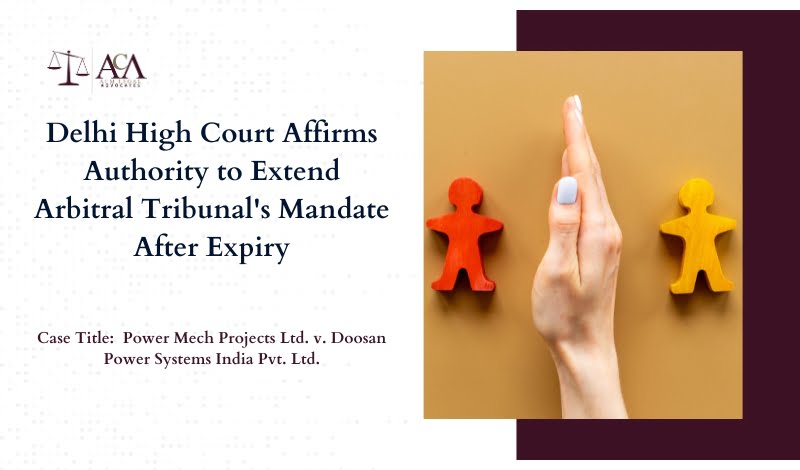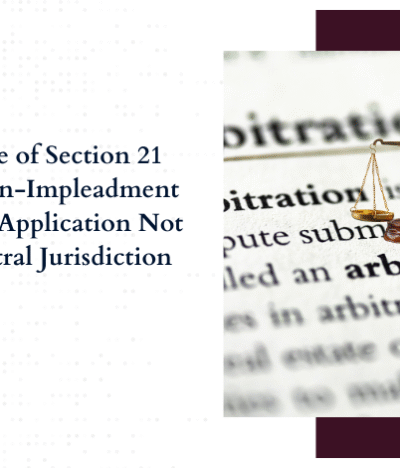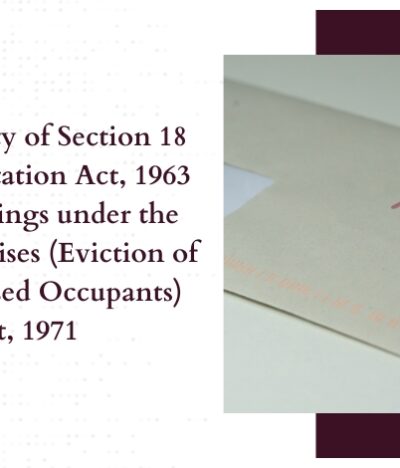In a recent ruling in Power Mech Projects Ltd. v. Doosan Power Systems India Pvt. Ltd., the High Court of Delhi reaffirmed the legal stance that under Sections 29A (4) and 29A (5) of the Arbitration and Conciliation Act, 1996 (“A&C Act”), a Court has the authority to extend the mandate of the arbitral tribunal, whether before or after the mandate’s expiration. This article reiterates the details and conclusions of the Delhi High Court’s decision.
Brief Facts
A petition was filed under Sections 29A (4) and 29A (5) of the Arbitration & Conciliation Act,1996 by Power Mech Projects Ltd. (“Petitioner”) seeking an extension of the mandate of a three-member arbitral tribunal. According to the petition, the parties entered a Works Contract on 12th May 2016, which covered the erection, testing, and commissioning of the “balance work of main plant package” and was supposed to be completed by 30th November 2018. However, the work was still ongoing when the petition was filed.
Disputes arose, leading the Petitioner to initiate arbitration proceedings under the Works Contract with the Indian Council of Arbitration by submitting a request for initiation of arbitration on 10 May 2022. A three-member arbitral tribunal commenced proceedings on 6th July 2022, but the proceedings were not concluded within a year. Consequently, under Section 29A of the A&C Act, both parties agreed to a six-month extension on 10th October 2023. Despite this, the mandate of the arbitral tribunal expired on 4th February 2024, leaving the proceedings at the cross-examination stage. Therefore, the Petitioner sought a 12-month extension of the tribunal’s mandate.
M/s Doosan Power Systems India Private Limited (“Respondent”) opposed the petition for extending the mandate, arguing that the Petitioner had intentionally delayed the arbitral proceedings. The Respondent pointed to various correspondences and orders suggesting that the Petitioner had sought unnecessary adjournments and caused delays during the arbitration.
The Respondent noted that the arbitral tribunal’s mandate ended on 4th February 2024. While the Respondent had no objection to continuing the tribunal’s mandate, they argued that since the mandate had expired by law, it could not be extended through the current petition. Additionally, the Respondent claimed that any consent given by the parties to extend the tribunal’s mandate was invalid. Finally, the Respondent asserted that the question of whether an extension could be granted was currently under consideration by the Supreme Court in the cases of Rohan Builders (India) Pvt. Ltd. v. Berger Paints India Ltd. and ATS Infrastructure Ltd. v. Rasbehari Traders.
Analysis
In these circumstances the Respondent argued that the Respondent argued that the current petition was not for “extension” of the mandate but “revival” of the arbitral tribunal’s mandate. The Delhi High Court noted that the question if the mandate of an arbitral tribunal could be extended under Section 29A (5) of the Arbitration Act after its expiry had been considered in several decisions by various High Courts.
The issue of the appropriate stages at which the mandate of an arbitral tribunal could be extended under Section 29A of the Arbitration Act was addressed in Wadia Techno-Engineering Services Limited v. Director General of Married Accommodation Project and ATC Telecom Infrastructure Pvt. Ltd. v. Bharat Sanchar Nigam Ltd. These decisions held that the mandate could be extended “either prior to or after the expiry of the specified period.
The High Court referenced the Calcutta High Court’s decision in Rohan Builders (India) Private Limited v. Berger Paints India Limited, which stated that if an arbitral award is not delivered within the specified time limits under Section 29A(1) and/or Section 29A(3) of the Arbitration Act, the tribunal’s mandate automatically expires. It emphasized that parties must file a petition under Section 29A(4) before the tribunal’s mandate expires, as seeking an extension post-expiry is impermissible according to legislative intent. The term ‘terminate’ in Section 29A(5) does not allow for ‘revival’ or ‘renewal’.
However, other High Courts, like the High Court of Jammu & Kashmir and the High Court of Kerala, have interpreted Section 29A(4) differently. The Jammu & Kashmir High Court, in H. P Singh v. G. M. Northern Railways, held that courts have the authority to extend the mandate of an arbitral tribunal beyond the initial or extended period specified under Section 29A(4). Similarly, the Kerala High Court, in Hiran Valiiyakkil Lal v. Vineeth M.V., allowed for an extension on sufficient cause, either before or after the expiry of the period provided under Section 29A (2) and (3).
Contrary to the Calcutta High Court’s position, the Bombay High Court in Nikhil H. Malkan v. Standard Chartered Investment and Loans (India) Ltd. adopted the interpretation of Section 29A(4) as provided by the Delhi High Court in ATC Telecom Infrastructure Pvt. Ltd. v. Bharat Sanchar Nigam Ltd. It disagreed with the Calcutta High Court’s decision in Rohan Builders and ruled that the court has the authority to consider extension petitions even after the mandate has expired, provided there are sufficient grounds. The High Court stated it could not follow the Calcutta High Court’s decision in Rohan Builders, which the Respondent relied on.
Conclusion
The High Court observed that the mandate of the Arbitral Tribunal expired on 4 February 2024, while the petition before the High Court was filed on 23 February 2024. Despite the expiration, the matter was still at the cross-examination stage. The High Court referred to Section 29A (4) of the Arbitration Act, noting that it uses the phrase “prior to or after expiry of the period so specified.” Based on this phrase, the High Court determined that it has the full authority to extend the mandate of the Arbitral Tribunal even after the initial period has expired. Therefore, the High Court extended the mandate of the Arbitral Tribunal until 31 December 2024.






